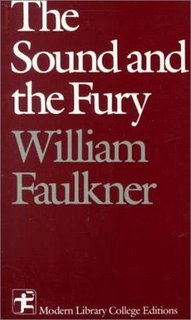 This is the Year of Faulkner for me, I guess. Faulkner is just one of the notable authors I've neglected in my reading life, but I'm catching up now. This summer I read As I Lay Dying and Soldiers' Pay, and now I've finished this one. I think I prefer Dying.
This is the Year of Faulkner for me, I guess. Faulkner is just one of the notable authors I've neglected in my reading life, but I'm catching up now. This summer I read As I Lay Dying and Soldiers' Pay, and now I've finished this one. I think I prefer Dying.Most are familiar with the MacBeth quote that provides the title to this book, but I'll supply it here for those who aren't:
She should have died hereafter;
There would have been a time for such a word.
To-morrow, and to-morrow, and to-morrow,
Creeps in this petty pace from day to day
To the last syllable of recorded time,
And all our yesterdays have lighted fools
The way to dusty death. Out, out, brief candle!
Life's but a walking shadow, a poor player
That struts and frets his hour upon the stage
And then is heard no more: it is a tale
Told by an idiot, full of sound and fury,
Signifying nothing.
My second problem reading this story is that the tale signifies nothing. The Compsons are the guttering candle, and they are small, petty people. This story is a masterpiece of demonstrating the shallowness and insignificance of life, but in the end you've experienced something that, by design, doesn't matter.
This really is a monumental piece of literature, worthy of study and emulation, but I don't know if I'll ever open it again. As I Lay Dying is just as impressive and it's enjoyable, to boot.
Next up: The God Delusion by Richard Dawkins.

No comments:
Post a Comment